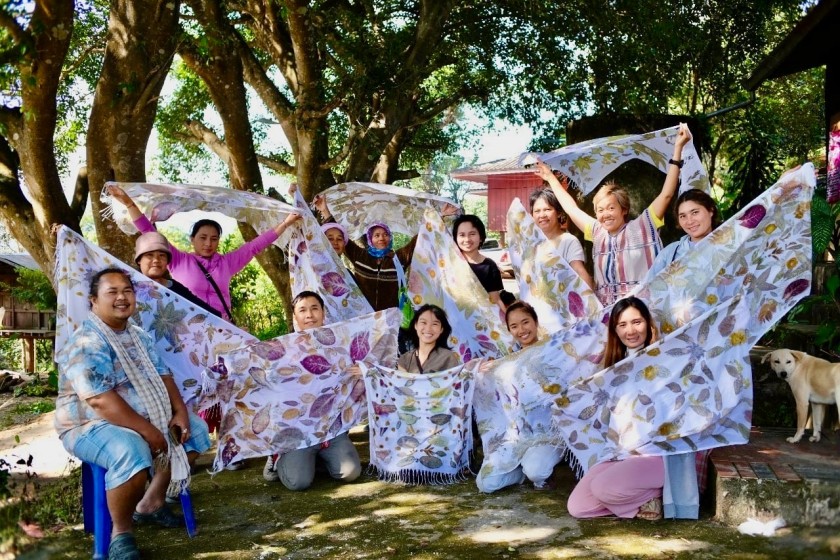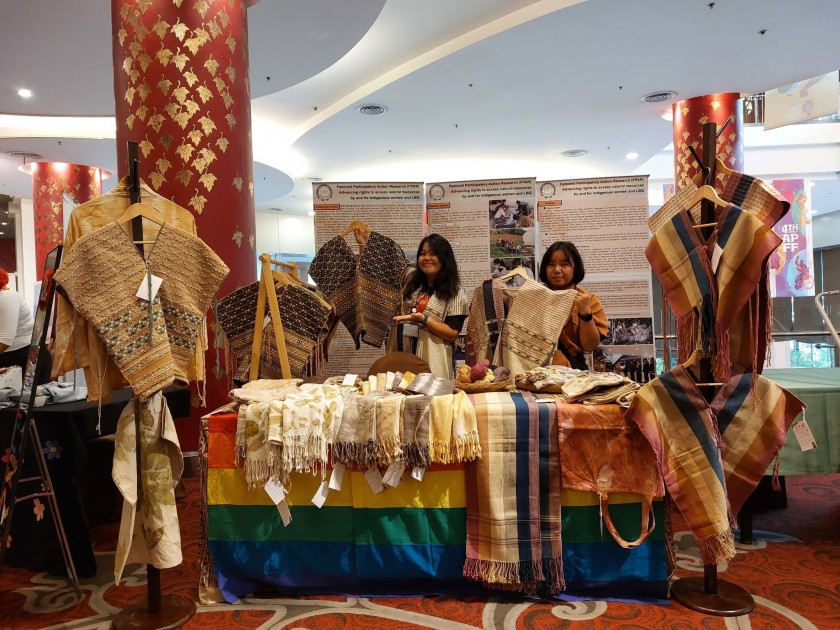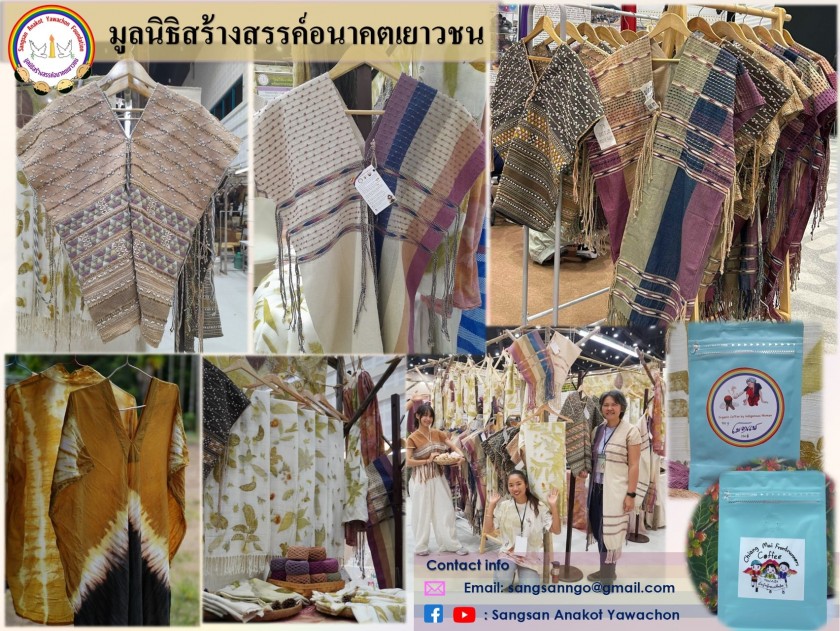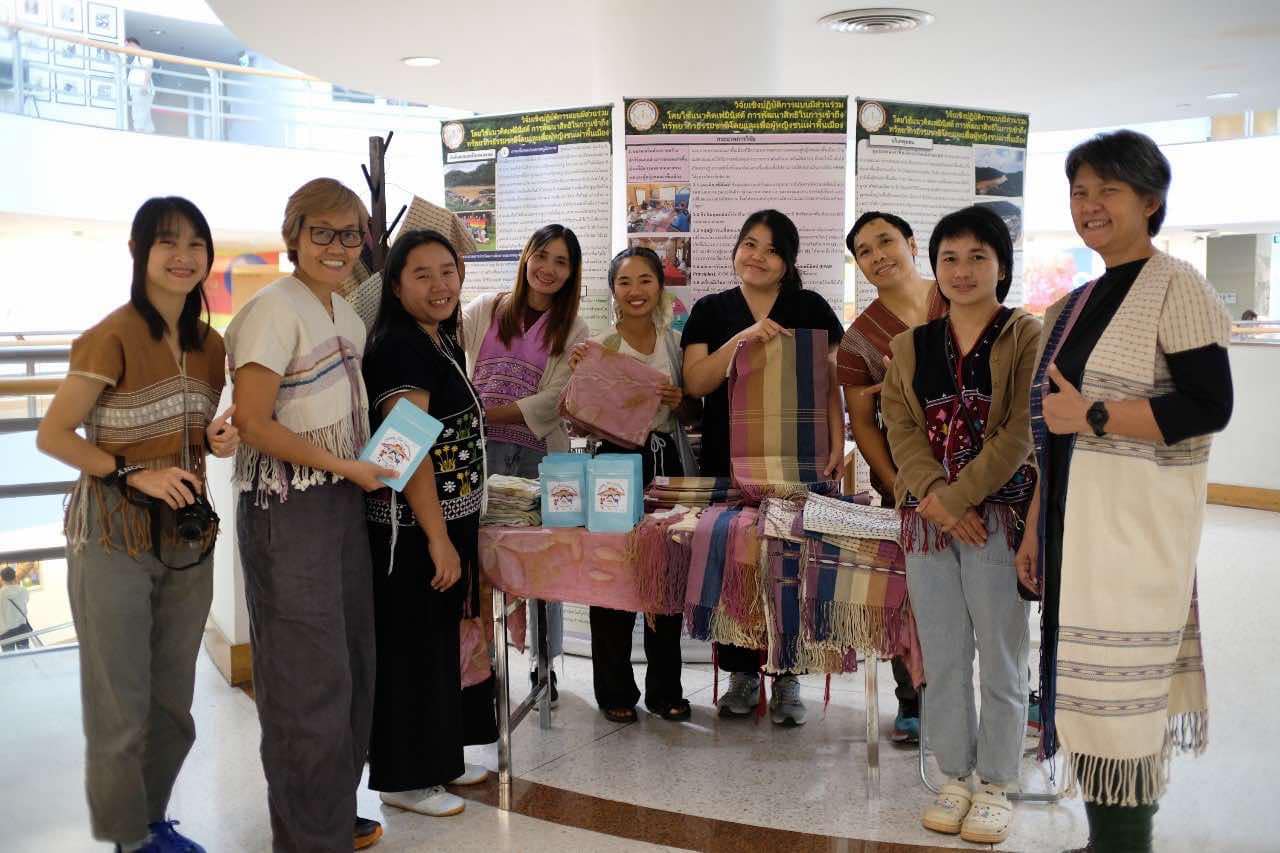“We weave a future where Young Indigenous Women and LBQ+ are empowered and leading economic justice”
From February 5–9, 2025, Sangsan Anakot Yawachon Foundation will proudly showcase and sell handcrafted products at Chiang Mai Craft Week. More than just a marketplace, this event is an opportunity to support Young Indigenous women and LBQ+ artisans, preserve their cultural heritage, and promote economic empowerment through traditional crafts.
Craft as Resistance: The Power of Young Indigenous Women and LBQ+ Entrepreneurship
For decades, Indigenous communities—especially those who identify as LBQ+—have faced systemic marginalization, land dispossession, and economic exclusion. Many are stateless, with limited access to opportunities. Yet, through craft, tradition, and sustainable entrepreneurship, these communities are reclaiming their rights and building a future of economic justice and cultural resilience.
At Chiang Mai Craft Week 2025, we are excited to present three unique product lines, each deeply rooted in heritage, sustainability, and activism:
First, there's Salawin - a remarkable textile collection that tells a powerful story. These aren't just ordinary fabrics - they're rainbow - 6 natural dye colored, Indigenous textiles made by indigenous young women who are holding stateless status in Mae Samlaep, Somoei District, Maehongson. What makes these pieces special is that they represent both cultural preservation and economic empowerment which generates an incomes for young indigenous women and LBQ who are stateless that affected by decades of armed conflict along the Myanmar border.

Salawin – The brand emerged from Indigenous Youth for Sustainable Development or IY4SD, Co – Founded and still leading by Mameaseng Siriwalai and Siriwan Phornin – LBQ young ethnicminority and/or indigenous feminist women human right defender - the excellence was recognized when it won the Youth Co-lab 2020 award, supported by UNDP. Each piece tells a story of resilience, as the community faces not only political challenges but also climate change as well as prevention of the environmental threats from the future of construction of the Salween Dams - a series of hydropower projects that could created most negative impact indigenous communities, way of life, enviromental and biodiversity.
Then we have Naw Se La, which showcases the incredible potential of eco-printing techniques. These products led by LBQ young indigenous women human right defender - Paphawadi Kongsungnoen and her members who come from the Nong Khti Su Nai, Bo-Kaew Subdistrict, Samoeng District, Chiang Mai province. This initiative is particularly meaningful because it helps a community that has historically suffered from mining industry impacts, offering them a new, environmentally sustainable source of income. The negative impacts of mining operations has affected everything from land, water quality to spiritual connections with the land, making this alternative livelihood particularly significant.
The third product line is Nor Om-Ki, featuring naturally dyed led and co-created by Daorung wiangwitcha and her members – an Indigenous young women and LBQ+ artisans from Ban Mae Om-Ki, Mae Wa Luang Subdistrict Tha Song Yang District, Tak Province. This community faces ongoing challenges due to land, natural resource related law and policies as well as National Preservated Act. And the National Park Act that restrict their traditional ways of life. They're also at risk from the proposed Yuam/Salween Water Diversion Project, making their economic justice possible through crafts even more crucial.
Why This Matters: Craft as a Movement for Achived Economic Justice
So, here is the key what makes these initiatives truly transformative - they're not just about selling products. They're about creating systemic change through what the foundation calls "development justice."
Every purchase is an act of solidarity, supporting communities working to protect their land, biodiversity, and economic future.
Think of it as a roots of justice tree: economic empowerment, cultural preservation, environmental sustainability, gender justice and LGBTIQAN+ rights all working together. This holistic approach recognizes that these issues are deeply interconnected and can't be addressed in isolation.
The economic impact extends far beyond simple income generation. When Indigenous women especially those who being LBQ+ gain collective financial independence, they become stronger voices in their communities. They're better positioned to advocate for their rights, participate in decision-making processes, and challenge traditional power structures that have historically marginalized them.
The foundation's approach to economic justice is grounded in feminist participatory action research, ensuring that solutions come from within the communities themselves. This bottom-up approach ensures that economic initiatives align with cultural values and community needs, rather than imposing external solutions that might not be sustainable in the long term.
The cultural preservation aspect is equally important and multifaceted. Each product carries forward traditional techniques and designs, helping younger generations maintain their connection to their heritage. This is crucial in a rapidly modernizing world where Indigenous knowledge is at risk of being lost. The products serve as tangible links between past and present, helping to ensure that traditional knowledge and skills are passed down to future generations.
These initiatives also challenge conventional economic models that often prioritize profit over people and planet. By incorporating traditional wisdom and sustainable practices, they demonstrate how business can be conducted in harmony with nature and cultural values. The use of natural dyes, for instance, isn't just an aesthetic choice - it's a statement about sustainable resource use and environmental stewardship.

The foundation's work has created ripple effects throughout these communities. We're seeing increased leadership roles for women and LBQ, stronger community bonds, and growing confidence in traditional knowledge and practices. Young people like Mameaseng Siriwalai, Daorung wiangwitcha, and Paphawadi Kongsungnoen are beginning to see their wisdoms, cultural heritage are the keys to succeeded in advancing economic justice which can create sustainable indigenous livelihoods. What's particularly innovative about this approach is how it combines identities, traditional, wisdom with alternative market opportunities.
These products aren't just being sold locally - they're reaching global markets through events like The 4th Asia Pacific Feminist Forum that took place on 12th-14th September 2024 in Chiang Mai, Thailand and AWID Forum 2024 in Bangkok—a powerful gathering of 4,000 feminist leaders driving change worldwide from 2-4 December 2024. In addition, the upcoming Chiang Mai Crafts Week, where you can find all these products from February 5-9, 2025 at Central Chiang Mai Airport. This event, featuring over 200 craft booths and workshops, provides a perfect showcase for these community-driven initiatives.
So, what makes these initiatives truly transformative? They’re not just about selling products—they’re about creating systemic change through what we call “development justice.”
Think of it as a roots of justice tree: Economic empowerment, Cultural preservation Environmental sustainability, Gender justice and LGBTIQAN+ rights - This holistic approach recognizes that these issues are deeply interconnected and must be addressed collectively.
Our economic justice approach is grounded in feminist participatory action research, ensuring that solutions come from within the communities themselves rather than imposing external, unsustainable interventions.
The impact of these initiatives extends far beyond our local communities.
- At The 4th Asia Pacific Feminist Forum (APFF) in Chiang Mai (September 12–14, 2024), these crafts were showcased alongside global feminist movements.
- At the AWID Forum 2024 in Bangkok (December 2–4, 2024), we joined 4,000 feminist leaders pushing for justice in all dimention included enviromental, climate and economic justice.
- Now, at Chiang Mai Craft Week, our products will be featured alongside over 200 craft booths and workshops.
Each of these events connects our movement to a global network of change-makers, ensuring that Indigenous and LGBTQ+ voices are heard.
Inconclusion, supporting These Crafts Means Investing In:
- Economic empowerment for Indigenous and LBQ+ artisans
- The preservation of traditional craftsmanship and ecological sustainability and biodiversity
- Resistance against economic injustice, gender inequality, homophobia, displacement, environmental destruction, climate change, and systemic oppressions
As a Founder and Executive Director of Sangsan Anakot Yawachon Foundation, I belived Economic Justice Program is transforming lives because our Indigenous crafts aren’t just products—they are stories of resilience, creativity, and innovative solutions. By choosing handcrafted, ethical products, you’re not just buying an item—you’re supporting a movement. You’re helping to create a future where Indigenous and LBQ communities thrive on their own terms.
Join Us at Chiang Mai Craft Week 2025, Central Chiang Mai Airport, from February 5–9, 2025
Follow us for updates and behind-the-scenes stories: www.facebook.com/saydpthailand

Our Documentary Film
- Advancing Economic Justice ny and for indigenous women and LBQ : https://youtu.be/XOAB8nsCVGA
- Feminist Participatory Action research on Addvancing right to natural resources by and for indigenous women and LBQ : https://youtu.be/WJuz1aggKCE
- Water is life: https://youtu.be/RIcgsAgitjc
- Naw Se La: https://youtu.be/F3fEDGJec2I
- Nor Om-Ki: https://youtu.be/wVu10kmbLXU
www.facebook.com/tcijthai
Tags






